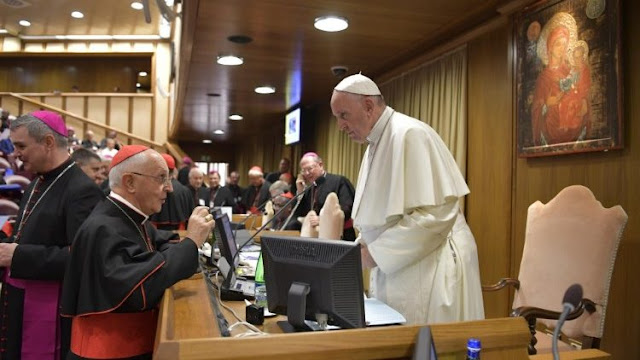Synod of Bishops: A Christian
obligation to welcome migrants
 |
| General Assembly of the Synod of Bishops on Youth. (Vatican Media) |
Ethiopian Cardinal addressed the issue of migration at
length today. He lamented how African migrants are treated in Europe.
By Russell Pollitt, SJ
The Synod assembly heard many interventions on the third
part of the working document, the Instrumentum Laboris. Dr Paolo
Ruffuni, Prefect of the Vatican Dicastery for Communications, began the press
briefing by saying that the Synod decided to write a letter to young people and
that a drafting committee has been setup.
He listed a number of issues that arose from the assembly.
These included the importance of helping young people read the Bible so that
the young can rediscover the Scriptures. The importance of faith in action and
community was emphasised as well as the need to rediscover fasting in the
western world. The role of women was once again a topic of discussion. There
needs to be a cultural conversion in the Church when it comes to the role of women,
they need to be given an equal place in society and the Church. There was a
proposal that a Synod on women should be convened, he said.
Dr Ruffini reported that it was suggested that a Pontifical
Council or Dicastery for the young be set up. The head of should have the same
powers as any other Council or Dicastery. It was said that a woman could head
up this venture.
Issues affecting Africa were addressed, most especially the
question of sustainable development. A lack of sustainable development leads to
migration. The Church needs to look at development models and find an adequate
one, if not we are always dealing with consequences (like migration) and not
dealing with the systemic problems. The issue of slavery, which involves all
countries, was also discussed.
Fr Alexandre Awi Mello, secretary of the Dicastery for the
Laity, the Family and Life, remarked that he was impressed with the process of
the Synod and the work that is being done. He said that the participation from
across the world is exceptional.
Migration: Where is Europe’s Christian conscience?
Cardinal Berhaneyesus Demerew Souraphiel from Ethiopia said
that migration within Africa affacted mostly young people. He said that the
arms trade was not spoken about at the Synod. This, sadly, causes a lot of
migration because of wars. Children are often used in the arms trade. He said
that for many youth in Africa it is frankly a question of survival before you
worry about technology and many other things that have been part of the
conversations at the Synod.
The Cardinal also mentioned the exploitation of minerals,
especially coltan in the Congo, and how this has displaced whole villages and
families because people are moved away so that extraction can take place. The
young, he said, are victims of this too.
Cardinal Souraphiel lamented how Africans are treated in
Europe. He said that when Europeans left for Africa it was much easier for
them. Africans are not treated in the same way that they were. He asked: Where
are the Christian roots of Europe? Where is the living out of Christianity? The
Cardinal said that it was a Christian value, a Christian obligation, to receive
the stranger. Speaking about governmental policies that keep migrants out, he
said that it was a matter that goes deep into the question of Christian
conscience.
Communion
It has been a great experience of communion, there has been
a great deal of listening, Archbishop Matteo Maria Zuppi of Italy said. This
helps us build a unitary approach and helps everyone focus their thoughts. He said
that communion is key if the Church wants to move forward. He says that Pope
Francis is the first to talk about communion. It you want to move away from
clericalism and nationalism then the way this is done is by seeking communion.
He said that the Church speaks to everyone and with everyone because the Church
wants to reach everyone. Communion, the archbishop says, is the real identity
of the Church.
A prophetic Church
Sr Alessandra Smerilli, lecturer in economics at the
Pontifical Faculty of Educational Sciences told the briefing that the Bishops
were really listening and that it was not superficial. She said that she could
sense a real love for the young. Sr Smerilli says that she dreams of a
prophetic church. She said that economics and ecology share the same roots and
that we cannot hear the cry of the young and the poor without hearing the cry
of the earth. She said that if we don’t care for the environment we generate a
new poverty and it is the young who are the victims of this poverty.
Sr Smerilli said that she believed that if the whole Church
put Laudato Si’ into action it would make a real difference in
the world. She says that Laudato Si’ addresses many issues
linked to poverty and human suffering.
Không có nhận xét nào:
Đăng nhận xét